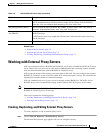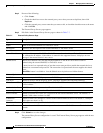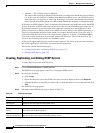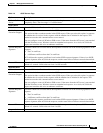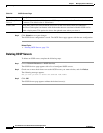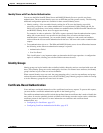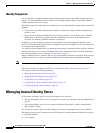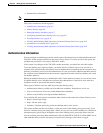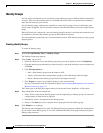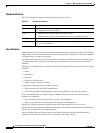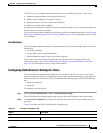
8-3
User Guide for Cisco Secure Access Control System 5.4
OL-26225-01
Chapter 8 Managing Users and Identity Stores
Overview
Identity Stores with Two-Factor Authentication
You can use the RSA SecurID Token Server and RADIUS Identity Server to provide two-factor
authentication. These external identity stores use an OTP that provides greater security. The following
additional configuration options are available for these external identity stores:
• Identity caching—You can enable identity caching for ACS to use the identity store while
processing a request in cases where authentication is not performed. Unlike LDAP and AD, for
which you can perform a user lookup without user authentication, the RSA SecurID Token Server
and RADIUS Identity Server does not support user lookup.
For example, in order to authorize a TACACS+ request separately from the authentication request,
taking into account that it is not possible for the identity store to retrieve the data because
authentication is not performed, you can enable identity caching to cache results and attributes
retrieved from the last successful authentication for the user. You can use this cache to authorize the
request.
• Treat authentication rejects as—The RSA and RADIUS identity stores do not differentiate between
the following results when an authentication attempt is rejected:
–
Authentication Failed
–
User Not Found
This classification is very important when you determine the fail-open operation. A configuration
option is available, allowing you to define which result must be used.
Identity Groups
Identity groups are logical entities that are defined within a hierarchy and are associated with users and
hosts. These identity groups are used to make policy decisions. For internal users and hosts, the identity
group is defined as part of the user or host definition.
When external identity stores are used, the group mapping policy is used to map attributes and groups
retrieved from the external identity store to an ACS identity group. Identity groups are similar in concept
to Active Directory groups but are more basic in nature.
Certificate-Based Authentication
Users and hosts can identify themselves with a certificate-based access request. To process this request,
you must define a certificate authentication profile in the identity policy.
The certificate authentication profile includes the attribute from the certificate that is used to identify the
user or host. It can also optionally include an LDAP or AD identity store that can be used to validate the
certificate present in the request. For more information on certificates and certificate-based
authentication, see:
• Configuring CA Certificates, page 8-71
• Configuring Certificate Authentication Profiles, page 8-75



